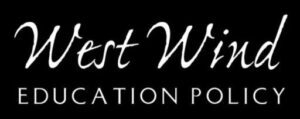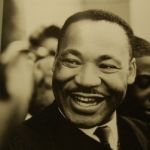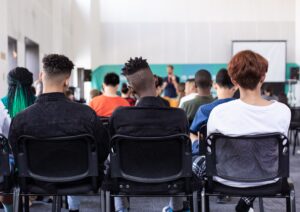Why We Retreat as a Team
 On Monday, the West Wind Education Policy team – including our colleague who telecommutes from 2 hours away – gathered in the West Wind offices for a staff retreat. We do this twice yearly and spend one to two days working together side-by-side. During this retreat we spent the first part of our day focused on our social media strategy for ourselves and our clients and partners. During the afternoon we spent some time discussing how we physically work together and how we could best use our space and the tools we have to make our work stronger and grow our relationships. Continue reading “Why We Retreat as a Team”
On Monday, the West Wind Education Policy team – including our colleague who telecommutes from 2 hours away – gathered in the West Wind offices for a staff retreat. We do this twice yearly and spend one to two days working together side-by-side. During this retreat we spent the first part of our day focused on our social media strategy for ourselves and our clients and partners. During the afternoon we spent some time discussing how we physically work together and how we could best use our space and the tools we have to make our work stronger and grow our relationships. Continue reading “Why We Retreat as a Team”


 Have you given much thought to how you learn? When you are planning learning experiences to help other professionals learn new knowledge and skills, are you using practices that will make a difference?
Have you given much thought to how you learn? When you are planning learning experiences to help other professionals learn new knowledge and skills, are you using practices that will make a difference? In education reform, technology increasingly allows us to work across classrooms, schools, districts, states, and often even international borders. Online dialogues via email are a way of life for most of us and we routinely connect through webinars, Google Plus, Discussion Forums, Twitter, Facebook, and many other platforms. Online communities of practice and collaboration sites allow ongoing working relationships that span time zones and geographical borders to promote continuous knowledge sharing. Many of you may have been part of a community of practice in the past or are currently a member of one or more of these types of communities – whether completely online, in-person, or a mixture of both. If you are not familiar with online communities of practice, visit the
In education reform, technology increasingly allows us to work across classrooms, schools, districts, states, and often even international borders. Online dialogues via email are a way of life for most of us and we routinely connect through webinars, Google Plus, Discussion Forums, Twitter, Facebook, and many other platforms. Online communities of practice and collaboration sites allow ongoing working relationships that span time zones and geographical borders to promote continuous knowledge sharing. Many of you may have been part of a community of practice in the past or are currently a member of one or more of these types of communities – whether completely online, in-person, or a mixture of both. If you are not familiar with online communities of practice, visit the  Everybody can be great, because anybody can serve.
Everybody can be great, because anybody can serve. The recently sworn-in 113th Congress has the most diverse membership in the history of our country’s government. As 82 new House members and 14 new senators assume their Congressional responsibilities, we will notice new firsts in the gender, racial, and ethnic composition of Congress. For the first time, the majority of House Democrats are made up of women, blacks, Hispanics and other ethnic minorities – almost 60 percent of the Democratic caucus.
The recently sworn-in 113th Congress has the most diverse membership in the history of our country’s government. As 82 new House members and 14 new senators assume their Congressional responsibilities, we will notice new firsts in the gender, racial, and ethnic composition of Congress. For the first time, the majority of House Democrats are made up of women, blacks, Hispanics and other ethnic minorities – almost 60 percent of the Democratic caucus.  In 2012 we observed each of the national cultural heritage months recognized by Presidential proclamation. In doing so, we wanted the actions of the observation to be sincere and to be part of our professional development at West Wind. We decided that for each cultural heritage month we would have a brown bag lunch during which we would explore each culture with a discussion including such things as: identity and naming of the groups in the culture being observed; counter-stories to the stereotypes of the culture; and what are some of the issues children and families face in the educational system. These brown bags have been a great source of learning, debate, and growth for us.
In 2012 we observed each of the national cultural heritage months recognized by Presidential proclamation. In doing so, we wanted the actions of the observation to be sincere and to be part of our professional development at West Wind. We decided that for each cultural heritage month we would have a brown bag lunch during which we would explore each culture with a discussion including such things as: identity and naming of the groups in the culture being observed; counter-stories to the stereotypes of the culture; and what are some of the issues children and families face in the educational system. These brown bags have been a great source of learning, debate, and growth for us.  Most of us have an idea of what the terms college and career ready mean – the skills, knowledge, and abilities necessary for a student to enter the workforce or postsecondary education. And no doubt most of us have encountered several variations on college and career readiness and how we achieve it for all students. Yet if we step back for a moment and consider these terms, the very order of the words seems to promote college readiness above career readiness. Now, I realize that words must come in some order and perhaps it just sounds better. Thinking too much about it could get us into a useless chicken or egg loop, but just humor me for a moment. When I looked at word order and thought about what we value most, my gut reaction was that career trumps college because college is the preparation for the career. But, the perennial student in me, kept saying, “College is not about a career. It is about learning and growing.” In fact college is about all of these – learning, growing as a person, and developing the skills to succeed in a chosen career.
Most of us have an idea of what the terms college and career ready mean – the skills, knowledge, and abilities necessary for a student to enter the workforce or postsecondary education. And no doubt most of us have encountered several variations on college and career readiness and how we achieve it for all students. Yet if we step back for a moment and consider these terms, the very order of the words seems to promote college readiness above career readiness. Now, I realize that words must come in some order and perhaps it just sounds better. Thinking too much about it could get us into a useless chicken or egg loop, but just humor me for a moment. When I looked at word order and thought about what we value most, my gut reaction was that career trumps college because college is the preparation for the career. But, the perennial student in me, kept saying, “College is not about a career. It is about learning and growing.” In fact college is about all of these – learning, growing as a person, and developing the skills to succeed in a chosen career.  Learning how to speak powerfully about critical educational issues is an essential skill for educators and advocates for students. RESULTS
Learning how to speak powerfully about critical educational issues is an essential skill for educators and advocates for students. RESULTS